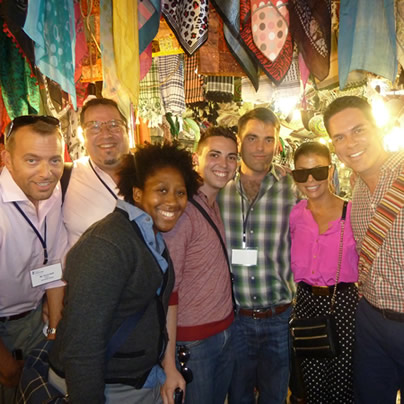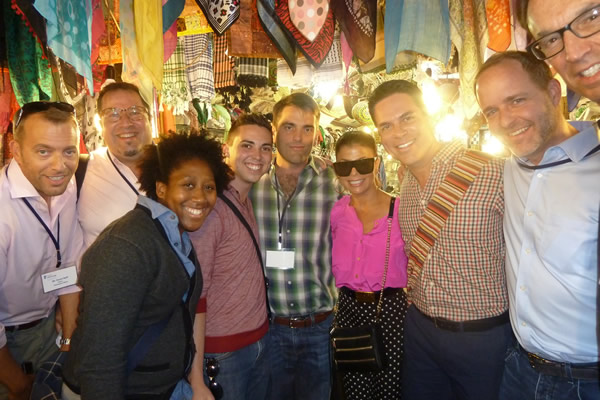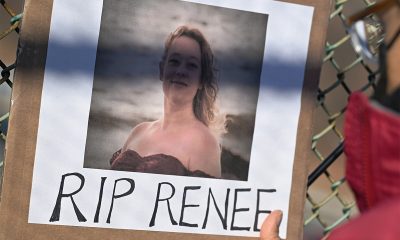Commentary
Is Israel ‘gay heaven?’ It’s complicated
American LGBT delegation visits Middle East


Project Interchange participants ran into Paula Abdul in the Jerusalem market. From left-right: Kevin Naff, Andy Sacher, Tamika Butler, John Campbell, Brad Sears, Paula Abdul, Jorge Valencia, Kirk Fordham and Malcolm Lazin. (Photo courtesy Project Interchange)
When a delegation of nine LGBT leaders from the United States arrived last month in Israel for an intensive seminar, we knew the gay residents of progressive Tel Aviv enjoyed broad acceptance and myriad legal protections. But imagine our surprise when TV personality Gal Uchovsky announced that we had arrived in “gay heaven.”
Israel is “the best LGBT country in the world,” he told us, adding that the nation’s LGBT residents face no serious problems that he could identify. A gay child growing up in rural Israel is better off than a similar kid in the rural United States, he observed. Homelessness is rare here and Israeli parents embrace their gay kids because, well, better to be gay than dead.
Uchovsky is a proud cheerleader for his country, which is endearing, though his privileged worldview has perhaps shielded him from some unpleasant, inconvenient realities. Life for LGBT Israelis is, indeed, more complicated than Uchovsky’s rosy assessment and, thus, our trip’s catchphrase was cemented: “It’s complicated.”
The stellar seminar, sponsored by Project Interchange, a program of the American Jewish Committee, brought me well out of my comfort zone and right into Ramallah and to the edge of the Gaza Strip. The focus of the visit — LGBT issues — was often overshadowed by the frustrating stalemate of the Palestinian-Israeli conflict. Why can’t the two sides come to an agreement on a two-state solution? It’s complicated. And, as we learned, it’s far more complicated than American mainstream media seem to grasp.
And so from the West Bank to Jerusalem to Tel Aviv to the Negev, the nine of us trekked to learn all we could from a diverse range of perspectives, including from Palestinians and Israeli experts critical of the country’s record on LGBT rights. The other eight participants in the weeklong seminar were: Log Cabin Republicans Executive Director Gregory T. Angelo; Tamika Butler of Young Invincibles; gay Harrisburg (Pa.) Treasurer John Campbell; Gill Action Fund Executive Director Kirk Fordham; Equality Forum Executive Director Malcolm Lazin; Lavender Effect Executive Director Andy Sacher; Williams Institute Executive Director Brad Sears; and Point Foundation CEO Jorge Valencia.
We toured Tel Aviv’s bustling, posh community center, touted as the only such center in the world that is municipally owned. The government’s funding of such centers and related LGBT causes is a mixed bag. In the United States, small LGBT non-profits and HIV service providers jockey for limited public grants, often leading to turf wars. But most such U.S. groups aren’t beholden to the government or muzzled by fears of government retaliation. It’s not clear that the same is true in Israel. It’s a dilemma: accept public money to advance your important work and mute your criticisms of the government or reject public funds and risk financial shortfalls that will curb programming. As one speaker put it, “I’d rather our public money went to gay causes than to building another bomb.”
The highlight of that visit for me was hearing from Uzi Even, the first openly gay member of the Knesset and a pioneering elder statesman of the Israeli LGBT rights movement who has helped rid the military of discriminatory policies and liberalize adoption laws. In a true sign of the times, his latest cause involves sorting out Israel’s divorce laws as they relate to same-sex couples.
My advice to Israeli LGBT advocates: Take time now to celebrate and honor the contributions of Even and others like him. Record his personal history and share it with young people. It wasn’t so long ago in Israel when gay sex acts were illegal. Such lightning-speed progress doesn’t happen by accident and brave pioneers like Even deserve our gratitude.
As we made our way up the stairs to meet with Even in the community center, we could hear the giggles of young children and stepped over a pile of neatly arranged kids sneakers in a hallway. Another sign of the times.
Several speakers emphasized the role that a 2009 shooting played in advancing gay acceptance. On Aug. 1, 2009, a gunman burst into the LGBT community center in Tel Aviv and opened fire, killing two and injuring at least 15 others. It’s hard to quantify how significant a role that tragedy played in changing Israeli attitudes toward gays, but our speakers agreed it was a turning point.
It’s a stark contrast to what we see in the United States, where violent hate crimes continue to plague our community, from trans women routinely killed in our inner cities to the recent murder of a gay man in the heart of New York’s gay village. Americans are so inured to violence that these crimes barely register in the mainstream media, let alone lead to a widespread change in attitudes.
After a couple of days in progressive Tel Aviv, we made our way to Jerusalem. In addition to the usual religious sites, a group of us visited the Jerusalem Open House, an LGBT community center engaged in broad grassroots work in the face of complicated problems like funding, space constraints, religious critics who have sometimes turned violent and the ever-present challenge of building relations with Arab residents of the city.
Celebrating gay pride in Jerusalem has been complicated, too. They don’t agree on much, but anti-gay animus was something that united the world’s major religions as conservative Jewish and Arab leaders denounced plans for pride parades in the holy city in recent years. In 2005, marchers were attacked by an ultra-orthodox Jewish man who stabbed three participants. The following year, Jerusalem was selected to host WorldPride, which led to more unrest and violent protests. Some lawmakers in the Knesset attempted to ban gay pride parades in Jerusalem, but those efforts fizzled. Our hosts in Jerusalem insist that relations are improving and that Pride is safer than in the recent past. Here, another stark contrast to the way we celebrate in the United States, with our corporate-sponsored pride villages, beer gardens and all-night parties.
From Jerusalem, we took a daytrip and toured Efrat, a small city in the Gush Etzion settlement bloc with its mayor, Oded Ravivi. The issue of settlements commands a lot of attention in U.S. media coverage of Israel and so I was curious and excited to see one up close. Efrat has eschewed the barbed wire fences that snake through so much of the Israeli landscape and officials have worked to cultivate economic ties with surrounding Palestinian villages. But we learned that such efforts only go so far. When the mayor approached a Palestinian schoolmaster about sending teachers to Efrat to teach Arabic to Israeli kids, he declined, fearing he would be “slaughtered” for collaborating with the Jews.
It was a sobering reminder of how moderates on both sides of the divide are thwarted by the extremists in their midst. Is there a cautionary lesson here for Americans, as our own political rhetoric becomes increasingly dominated by the most extreme, shrill voices of the far left and right; our legislators afraid to compromise and be seen as collaborating with the opposition?
In one awkward moment, a member of our group asked Mayor Ravivi how he would react if one of his children came out to him as gay. He seemed startled by the question and suggested it couldn’t happen in his family. Cue the eye rolling among some of us. Such reactions are common among many who proclaim they don’t discriminate but haven’t devoted much thought to the underlying issues. Gay kids are good for conservative politicians — just ask Dick Cheney.
After absorbing the complicated problems and history of Jerusalem, some of us needed a release and our gracious hosts at Open House took us to the lone gay bar in Jerusalem, called Video, where we had a few drinks and danced till the wee hours alongside a diverse crowd of revelers. Music, indeed, makes the people come together.
Accusations of ‘pinkwashing’
The concept of “pinkwashing” emerged as a hot topic throughout the week. Some critics claim the country’s embrace of LGBT rights is merely a propaganda effort to claim the mantle of modernity and establish a stark contrast to homophobic regimes in the West Bank, Gaza and elsewhere in the Middle East. These critics claim the government’s support for gay rights doesn’t threaten or undermine the structure of Israel and amounts to a “fig leaf,” and an attempt at distracting attention from the difficult problems of finding peace with the Palestinians.
I’m not convinced. Politics is about the art of the possible, not the ideal and certainly not the perfect. Sometimes we have to accept imperfect solutions or motives in the interest of securing protections for people in need. What’s most striking about Israel’s LGBT record isn’t what it has achieved legislatively or through court rulings, but the fact that all this progress is happening in the heart of the Middle East. Our group trip featuring nine outspoken American LGBT advocates is simply not possible anywhere else in the region. Even compared to the progress we’ve seen recently in the United States, Israel stands out because it is such a young country enacting these reforms. Americans are notoriously forward thinking and, as a result, we tend to forget our history. It was less than 10 years ago when President George W. Bush called for a federal constitutional amendment banning same-sex marriage and scores of states enacted their own constitutional bans. The architect of this shameful attack on LGBT rights was Ken Mehlman, a closeted gay man and modern-day Roy Cohn who has since come out as gay and now raises money for marriage equality campaigns. The change afoot is new and fast but fragile. Would America be seeing such dramatic change now if Mitt Romney had won last year’s election?
Meanwhile, Israel opened its military to out gays and lesbians and transgender service members — something still barred by the U.S. military. There is relationship recognition, if not full marriage equality. The government directly funds and supports the LGBT movement, for better or worse. And it doesn’t hide that support, but promotes it.
Still, some see nefarious motives.
Upon returning home from this trip, I received a letter criticizing the visit from a group called New York City Queers Against Israeli Apartheid. It read, in part:
“The delegation met with some unspecified ‘Palestinian officials in Ramallah,’ which strikes us as nothing but a token gesture. Worse, ‘pinkwashing’ — the attempt to use Israel’s supposedly decent record on gay rights to whitewash Israeli occupation and apartheid — has been front and center in international LGBT organizing over the past several years, particularly in the US. Any delegation of LGBT ‘leaders’ to Israel that doesn’t address it is clearly intended to contribute to pinkwashing.”
Our group was sensitive to pinkwashing from the outset and several of us requested meetings with gay Palestinians and their representatives. Project Interchange worked hard to provide a balanced view of the issues and invited two Palestinian LGBT groups — alQaws and Aswat — to meet with us. Officials at the Tel Aviv and Jerusalem LGBT centers were also asked if they could assist in persuading those groups to meet our delegation or knew of other Palestinian LGBT representatives who would be willing to meet us. Sadly, the groups refused to meet with us. Change is simply not possible without dialogue and I deeply regret this lost opportunity the Palestinians had to engage with an open-minded group of visitors seeking nothing more than understanding and education.
(I invited NYCQAIP to respond to this story and they accepted. I look forward to publishing their reaction and thoughts on pinkwashing in the coming days.)
In Ramallah, we were scheduled to meet with Dr. Saeb Erekat, the chief Palestinian negotiator. He cancelled his appearance and we learned why the next day: He had just submitted his resignation to Palestinian President Mahmoud Abbas over frustration with the pace of negotiations. Abbas rejected Erekat’s resignation but it’s clear that the current talks, which began four months ago with a John Kerry-instigated deadline of nine months, are not going well. Given the sorry record of our involvement in decades of failed talks, perhaps it’s time for the United States to step aside and allow another party a chance at diplomacy.
In Erekat’s place, we met with Abu Zayyad, a scholar and Fatah and PLO adviser. It seemed somewhat silly to ask him about the state of LGBT affairs given all the day-to-day challenges facing Palestinians in the West Bank. But he insisted that there is a level of gay acceptance, even if such views differ widely among family members, noting there are no laws in Ramallah related to gay issues and that there are at least two non-governmental organizations that espouse gay rights. He spent most of his lecture discussing the state of life for Palestinians and much of what he said was not encouraging. He lamented the lack of mobility for Palestinians, who don’t have passports, making international travel difficult at best. Locally, the checkpoints that Ramallah residents must navigate just to visit nearby Jerusalem create daily headaches. Zayyad, who said he spent three months in prison for participating in an anti-Israel protest, fears that a two-state solution will be impossible five years from now, when an estimated one million Israelis could be living in West Bank settlements.
“It will explode again,” he warned.
It’s often been said that Israel is a land of contradictions and that assessment came into sharp focus during our visit. Israel celebrates its status as the only Democracy in the Middle East, while its non-Jewish residents live under a flag adorned with religious iconography. In a nation so steeped in history, Israel is just 65 years old and is surprisingly lacking in many traditions. Located in the heart of the Middle East, where homosexuality can be punished by jail time or even death as in Iran, Israel has emerged as one of the world’s most pro-LGBT nations. A country that is more than 60 percent desert has perfected drip irrigation and desalinated water from the Mediterranean to solve a decades-old water crisis. And in a nation with such ancient religious influences, a large chunk of the population — estimated by one speaker as high as 50 percent — identifies as secular or atheist.
It’s impossible to summarize our weeklong adventure in a couple thousand words. A sincere and heartfelt thank-you to the team at Project Interchange, all of our speakers and to the people of Israel for their hospitality. In addition to the aforementioned experiences, we met with law professor Aeyal Gross, entrepreneur Hamutal Meridor, Times of Israel editor David Horovitz, Jerusalem Post reporter Khaled Abu Toameh, former Knesset member Einat Wilif, film director Eytan Fox and many others. We were serenaded by Ivri Lider; walked the Stations of the Cross; toured Yad Vashem, the Western Wall tunnels, the Mahaneh Yehuda Market and indulged in far too much of Israel’s impressive cuisine. We visited Sderot, Mitzpe Ramon and slathered ourselves in mud before floating in the Dead Sea.
It was in that moment — nine of us standing half naked, covered in mud — that I perceived a lasting bond forming among us. Despite our differing views on policy back home and occasional misunderstandings, we’d been through something emotional, powerful and unique together. An experience impossible to explain or summarize here, because, well, it’s complicated.
Kevin Naff is editor of the Washington Blade. Reach him at [email protected].
Commentary
Honoring 50 queer, trans women with inaugural ‘Carrying Change’ awards
Naming the people who carry our movements forward

Dear friends, partners, and community:
We write to you as two proud Black and Brown queer women who have dedicated our lives to building safer, bolder, and more just communities as leaders, organizers, policy advocates, and storytellers.
We are June Crenshaw and Heidi Ellis.
June has spent almost 10 years guiding the Wanda Alston Foundation with deep compassion and unwavering purpose, ensuring LGBTQ+ youth experiencing homelessness have access to stability, safety, and a path forward. Her leadership has expanded housing and support services, strengthened community partnerships, and helped shift how Washington, D.C. understands and responds to the needs of queer and trans young people. In her current role with Capital Pride Alliance, June advances this work at a broader scale by strengthening community infrastructure, refining organizational policies, and expanding inclusive community representation.
Heidi is the founder of HME Consulting & Advocacy, a D.C.–based firm that builds coalitions and advances policy and strategy at the intersection of LGBTQ+ justice and racial equity. Her work spans public service, nonprofit leadership, and strategic consulting to strengthen community-driven solutions.
We’re writing because we believe in intentional recognition — naming the people who carry our movements forward, who make room for those who come next, and who remind us that change is both generational and generative. Too often, these leaders do this work quietly and consistently, without adequate public acknowledgment or what one might call “fanfare,” often in the face of resistance and imposed solitude — whether within their respective spaces or industries.
Today, we are proud to introduce the Torchbearers: “Carrying Change” Awards, an annual celebration honoring 50 unstoppable Queer and Trans Women, and Non-Binary People whose leadership has shaped, and continues to shape, our communities.
This inaugural list will recognize:
- 25 Legends — long-standing leaders whose decades of care, advocacy, and institution-building created the foundations we now stand upon; and
- 25 Illuminators — rising and emerging leaders whose courage, creativity, and innovation are lighting new paths forward.
Why these names matter: Movement memory keeps us honest. Strategy keeps us effective. Recognition keeps us connected. By celebrating both Legends and Illuminators side by side, we are intentionally bridging histories and futures — honoring elders, uplifting survivors, and spotlighting those whose work and brilliance deserve broader support, protection and visibility.
Who will be included: The Torchbearers will represent leaders across a diverse range of sectors, including community organizing, public service, sports, government, entertainment, business, education, legal industry, health, and the arts — reflecting the breadth and depth of queer leadership today. They include organizers providing direct service late into the night; policy experts shaping budgets and laws; artists and culture workers changing hearts and language; healers and mutual-aid leaders; and those doing the quiet, essential work that sustains us all.
Intersectionality is our core commitment: identity in its fullness matters, and honorees must reflect the depth, diversity, and nuance of queer leadership today.
How you can engage: Nominate, amplify, sponsor, and attend. Use your platforms to uplift these leaders, bring your organization’s resources to sustain their work, and help ensure that recognition translates into real support — funding, capacity, visibility, and protection.
We are excited, humbled, and energized to stand alongside the women and non-binary leaders who have carried us, and those who will carry this work forward. If history teaches us anything, it’s that the boldest change happens when we shine light on one another, and then pass the flame.
YOU CAN MAKE A NOMINATION HERE
June Crenshaw serves as deputy director of the Capital Pride Alliance. Heidi Ellis is founder of HME Consulting & Advocacy.
Commentary
Protecting the trans community is not optional for elected allies and candidates
One of oldest political tactics is blaming vulnerable group for societal woes

Being an ally to the trans community is not a conditional position for me, nor should it be for any candidate. My allyship doesn’t hinge on polling, focus groups, or whether courage feels politically convenient. At a time when trans people, especially trans youth of color, are under coordinated attack, elected officials and candidates must do more than offer quiet support. We must take a public and solid stand.
History shows us how these moments begin. One of the oldest political tactics is to single out the most vulnerable and blame them for society’s anxieties — not because they are responsible, but because they are easier to blame than those with power and protection. In Nazi Germany, Jewish people were primarily targeted, but they were not the only demographic who suffered elimination. LGBTQ people, disabled people, Romani communities, political dissidents, and others were also rounded up, imprisoned, and killed. Among the earliest acts of fascistic repression was the destruction of Berlin’s Institute for Sexual Science, a pioneering center for gender-affirming care and LGBTQ research. These books and medical records were among the first to be confiscated and burned. It is not a coincidence that these same communities are now the first to suffer under this regime, they are our canaries in the coal mine signaling what’s to come.
Congress, emboldened by the rhetoric of the Donald Trump campaign, recently passed HR 3492 to criminalize healthcare workers who provide gender-affirming healthcare with fines and imprisonment. This bill, sponsored by celebrity politicians like Marjorie Taylor Greene, puts politics and headlines over people and health outcomes. Healthcare that a number of cis-gendered people also benefit from byway of hair regeneration and surgery, male and female breast augmentation, hormone replacement therapy etc. Even when these bills targeting this care do not pass, they do real damage. They create fear among patients, legal uncertainty for providers, and instability for clinics that serve the most marginalized people in our communities.
Here in D.C., organizations like Planned Parenthood and Whitman-Walker Health are lifelines for many communities. They provide gender-affirming care alongside primary care, mental health services, HIV treatment, and preventative medicine. When healthcare is politicized or criminalized, people don’t wait for court rulings — they delay care, ration medication, or disappear from the system entirely.
As a pharmacist, I know exactly what that means. These are life-saving medications. Continuity of care matters. Criminalizing and politicizing healthcare does not protect children or families — it puts lives at risk.
Instead of centering these realities, political discourse has been deliberately diverted toward a manufactured panic about trans women in sports. Let me be clear: trans women deserve to be protected and allowed to compete just like anyone else. Athletics have always included people with different bodies, strengths, and abilities. Girls and women will always encounter competitors who are stronger or faster — that is not a gender or sports crisis, it is the nature of competition.
Sports are meant to teach fairness, mutual respect, and the shared spirit of competition — not suspicion or exclusion. We should not police young people’s bodies, and we should reject attempts to single out trans youth as a political distraction. Families and doctors should be the authority on sex and gender identity.
This narrative has been cynically amplified by the right, but too often Democrats have allowed it to take hold rather than forcefully rejecting it. It is imperative to pay attention to what is happening — and to push back against every attempt to dehumanize anyone for political gain.
Trans people have always been part of our communities and our democracy. Protecting the most vulnerable is not radical — it is the foundation of a just society. My work is grounded in that commitment, and I will not waver from it. I’m proud to have hired trans political team Down Ballot to lead my campaign for DC Council At Large. We need more ally leaders of all stages to stand up for the LGBTQ+ community. We must let elected detractors know that when they come for them, then they come for all of us. We cannot allow Fox News and social media trolls to create a narrative that scares us away from protecting marginalized populations. We must stand up and do what’s right.
Anything less is not leadership.
Rep. Oye Owolewa is running for an at-large seat on the D.C. Council.
Commentary
America is going in the wrong direction for intersex children
Lawmakers are criminalizing care for trans youth, while permitting irreversible harm to intersex babies

I live with the consequences of what America is willing to condone in the name of “protecting children.”
When I was young, doctors and adults made irreversible decisions about my body without my informed consent. They weren’t responding to an emergency. They were responding to discomfort with innate physical differences and the social and medical pressure to make a child’s body conform to a rigid female-male binary. That’s the part people like to skip over when they talk about “child welfare”: the harm didn’t begin with my identity. It started with adults deciding my healthy body needed fixing.
That’s why the hypocrisy unfolding right now from statehouses to Capitol Hill feels so familiar, and so dangerous.
While harmful medical practices on intersex children, the nearly 2 percent born with differences in one or more of their physical sex characteristics, have been ongoing in the U.S. for decades, until recently, there was no law specifically condoning it.
This month, House Republicans passed one of the most extreme anti-trans bills in modern American history, advancing legislation that would criminalize gender-affirming medical care for transgender youth and threaten doctors with severe penalties for providing evidence-based treatment. The bill is framed as a measure to “protect children,” but in reality, it weaponizes the criminal legal system against families and providers who are trying to support young people in surviving adolescence.
At the same time, the administration has proposed hospital and insurance policies designed to choke off access to affirming care for trans youth nationwide by making providers fear loss of federal funding, regulatory retaliation, or prosecution. This is a familiar strategy: don’t just ban care outright; instead, make it so risky that hospitals stop providing it altogether. The result is the same everywhere. Young people lose access to care that major medical associations agree can be lifesaving.
All of this is happening under the banner of preventing “irreversible harm.”
But if America were genuinely concerned about irreversible harm to minors, the first thing lawmakers would address is the medically unnecessary, nonconsensual surgeries still performed on intersex infants and young children, procedures that permanently alter healthy tissue, often without urgent medical need, and long before a child can meaningfully participate in the decision. Human rights organizations have documented for years how these interventions are justified not by medical necessity, but by social pressure to make bodies appear more typically “female” or “male.”
Here is the uncomfortable truth: all of the state laws now banning gender-affirming care for transgender youth explicitly include exceptions that allow nonconsensual and harmful intersex surgeries to continue.
A recent JAMA Health Forum analysis found that 28 states have enacted bans on gender-affirming care for minors that carve out intersex exceptions, preserving doctors’ ability to perform irreversible “normalizing” procedures on intersex children even while prohibiting affirming care for trans adolescents.
This contradiction is not accidental. It reveals the real priority behind these laws.
If the goal were truly to protect children from irreversible medical interventions, intersex kids would be protected first. Instead, these policies target one group of children, transgender youth, while continuing to permit permanent interventions on another group whose bodies challenge the same rigid sex and gender binary that lawmakers are trying to enforce.
Intersex people are routinely erased from American policy debates, except when our bodies are invoked to justify harmful laws, warning that intersex children are being used as legal loopholes rather than protected as human beings. This “protect the children” rhetoric is routinely deployed to justify state control over bodies, while preserving medical practices that stripped intersex children like me of autonomy, good health, and choice. Those harms are not theoretical. They are lifelong.
What makes this moment even more jarring is that the federal government had finally begun to recognize intersex people and attempt to address the harms suffered.
In 2024, at the very end of his term, the Biden administration released the first-ever intersex health equity report — a landmark admission that intersex people have been harmed by the U.S. health care system. Issued by the Department of Health and Human Services, the report documents medically unnecessary interventions, lack of informed consent, and systemic erasure and recommends delaying irreversible procedures until individuals can meaningfully participate in decisions about their own bodies.
This should have been a turning point. Instead, America is moving in the opposite direction.
On day one, President Trump issued an executive order defining “sex” in a way attempting to delegitimize the existence of transgender Americans that also erased the existence of many intersex people.
When medicine is used to erase difference, it is called protection, while care that supports self-understanding is treated as a threat. This is not about medicine. It is about control.
You cannot claim to oppose irreversible harm to children while legally permitting surgeries that intersex adults and human rights experts have condemned for decades. You cannot claim to respect bodily autonomy while denying it selectively, based on whose bodies make lawmakers uncomfortable.
Protecting children means protecting all children, transgender, intersex, and cisgender alike. It means delaying irreversible interventions when they are not medically necessary. It means trusting and supporting young people and families over politicians chasing culture-war victories.
America can continue down the path of criminalizing care for some children while sanctioning harm to others, or it can finally listen to the people who have lived the consequences.
Intersex children deserve laws that protect their bodies, not politics that hurt and erase them.
Kimberly Zieselman is a human rights advocate and the author of “XOXY: A Memoir”. The author is a co-author of the JAMA Health Forum article cited, which examined state laws restricting gender-affirming care.
-

 Theater5 days ago
Theater5 days agoFord’s ‘First Look’ festival showcases three new productions
-

 Bars & Parties5 days ago
Bars & Parties5 days agoMid-Atlantic Leather kicks off this week
-

 U.S. Supreme Court3 days ago
U.S. Supreme Court3 days agoSupreme Court hears arguments in two critical cases on trans sports bans
-

 Photos5 days ago
Photos5 days agoPHOTOS: ‘ICE Out For Good’ Sunday protests




















